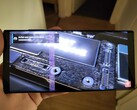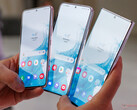The Samsung Galaxy S22 Ultra is powered by the Exynos 2200 in the EU while other regions such as India and the U.S. will be getting ones based on the Snapdragon 8 Gen 1. While the embargo for the Galaxy S22 series is yet to be lifted, a YouTuber has already posted some initial GPU benchmarks comparing phones with both the SoCs.
YouTuber Erdi Özüağ, who also goes by the handle @fx57 on Twitter, has reviewed the Galaxy S22 Ultra on his channel. He seemed to have access to both the Exynos 2200 as well as the Snapdragon 8 Gen 1 variants of the S22 Ultra. The Exynos 2200 SoC offers an AMD RDNA 2-based GPU, which Samsung calls the Xclipse 920. In Özüağ's tests, the Xclipse 920 performs considerably slower than the Adreno 730 in the Snapdragon 8 Gen 1.
In 3DMark Wildlife, the Exynos 2200 scored 6,684 points while the Snapdragon 8 Gen 1 is nearly 43% faster with 9,548 points. Also, the Exynos 2200 seems to be only about 7% faster than the Exynos 2100 (6,256 points), which used a Mali-G78 MP14 GPU. In GFXBench Manhattan offscreen, the Snapdragon 8 Gen 1 seems to be about 30% faster than the Exynos 2200, which in turn is on par with the Exynos 2100. It may be noted that the Xclipse 920 is rated for a 1,300 MHz clock against the 818 MHz of the Adreno 730.
These results seem to contradict what we've reported before. For instance, the Xclipse 920 was earlier shown to be nearly 51% faster than the Adreno 730 in Geekbench OpenCL while managing leads of about 23.9% in the Vulkan variant of the test. In a previous 3DMark Wildlife Extreme Stress test result, the Exynos 2200 proved to offer better sustained performance with a 72.2% stability compared to 63% for the Snapdragon 8 Gen 1.
It is not clear as to why the performance deltas, at least on the GPU side of things, are so high. Özüağ expects a major software update that should be able to normalize these differences, but that's just speculation for now.
That being said, the YouTuber does offer a few reasons as to why the Xclipse 920 isn't performing on expected lines. One possible reason is that the RDNA 2-based Xclipse 920 is starving for engine clock and possibly, even memory bandwidth or performance of the on-die Infinity Cache. Also, the 4 nm process and low-power requirements may be limiting the GPU's ability to sustain boosts for longer periods of time.
If this indeed turns out to be an architectural issue, OTA updates can only help so much. Even then, this still raises the question as to how previous benchmark leaks showed the Exynos 2200 to have a performance advantage over the Snapdragon 8 Gen 1. In any case, we will know more once we get to test the Galaxy S22 series ourselves. The first few OTA patches could be crucial before actual performance differences between the two SoCs can be properly adjudicated.


































